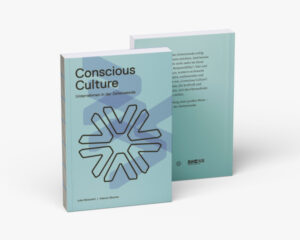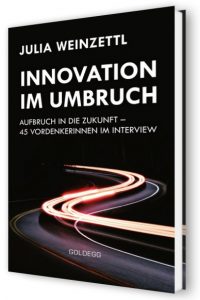Prof. Dr. Eva Horn,
Professor of Modern German Literature at the University of Vienna
Reading Time: 4 minutes
The change and interventions humans have made on Earth manifest themselves – literally – in something ‘epochal’: our age has changed. We have left the Holocene, which marks the beginning of human civilization, and have entered the Anthropocene – the period in which human impact on the Earth is growing exponentially and causing long-term changes. These changes have passed a threshold that can no longer be reversed. Becoming aware of this and developing an understanding of the fact that we are not separate from the ‘big picture’ either as a person, a country, or a continent is an important step, just as a global policy is needed that addresses these problems beyond national special interests.
Interview by Julia Weinzettl
In the spirit of the taskfarm concept, Prof. Dr. Eva Horn was invited to the interview by Helmut Blocher.

What is the Anthropocene?
Prof. Eva Horn: The term Anthropocene is the name given to a new geochronological epoch: namely, the age in which humans have become one of the most important factors influencing biological, geological, and atmospheric processes on Earth.
The term was brought into play in 2000 by Dutch chemist Paul Crutzen and officially proposed in 2016 at the International Geological Congress in Cape Town. The Anthropocene begins in the 19th century with the Industrial Revolution, but geologists set its start in the 1950s, when nuclear tests left a globally detectable trail of plutonium.
It is a period in which the impact of humans on the Earth grows exponentially and causes long-term changes.
These include, for example, the atomic bomb tests, population growth, the excessive use of petroleum, the use of artificial fertilizers in agriculture, as well as plastic pollution of the world’s oceans, species displacement and extinction, environmental pollution, and climate change. The Anthropocene thus stands for man-made ecological problems. Because these are escalating more and more rapidly, scientists call the phase we are currently in the ‘Great Acceleration.
This acceleration is exponential. This means that the Anthropocene is not just a concept for the present time and the epoch in which we live, but it is a dynamic concept that sums up this acceleration.
What is the trigger to determine a change of epoch??
Prof. Eva Horn: The core message of the Anthropocene is that we have crossed a threshold. It is not simply a crisis that will get better after it hits bottom, but we have come across a point where humans have caused irreversible interventions on Earth. Such as changing water cycles and using soils for cities and agriculture. Water goes through a complicated cycle, from the ocean to the air and the soil. The water in the air – the humidity – is essential for plants, animals, and humans.
Another example is species loss – this is not just about the often-cited ‘poor polar bears.’ When you think about how dependent we are on certain species of insects as they pollinate plants, the scope of species loss takes on a different, existential dimension for us as well. These are just a few facets of the Anthropocene.
It seems like a summary of all the problems or all the outrages humans have done to nature.
Prof. Eva Horn: In a way, it summarizes them, but the Anthropocene is much more than that. The Anthropocene refers not to a problem but to a meta crisis consisting of quite a few ecological changes – some of which we may not even know about yet. In plain language, this means that what was true for the last 12,000 years, namely the Holocene era marking the beginning of human civilization, is now over.
Man is the namesake of this new geological epoch, which means being the cause of changes and bearing the responsibility for what is happening.
We are standing at the ‘point of no return.’ What can we do now?
Prof. Eva Horn: One of the most important steps is to become aware that something has to be done. And on a bigger scale but the part of the individual. For whom the problems often seem too big to solve, who therefore rests their hands in their lap. But small steps do count, like the fact that it doesn’t have to be the newest cell phone every year, or it is no improvement to replace a gasoline car with an electric vehicle.
The critical point is understanding that we are not separate from the ‘big picture’ either as a person, a country, or a continent. The plastic islands in the Pacific, for example, didn’t emerge because people in Asia throw away more plastic but because they were washed there by ocean currents.
It’s about changing the overall way of thinking about life on Earth and creating a different approach. We are not dealing with individual problems but with complex interconnections and domino effects. Due to the massive change in the Earth’s entire ecosystem, there is no longer any nature untouched by man. Man as an intruder has had an impact on everything. One idea of rethinking is understanding humans as participants in networks and cycles, not simply using nature as a ‘resource,’ but understanding animals, plants, landscapes, water cycles, and climates as co-existence that also have a right to be intact. Therefore, a rethinking of the population is just as necessary as a global policy that addresses these problems beyond national special interests.
About
Prof. Dr. Eva Horn is Professor of Modern German Literature at the University of Vienna. She has taught in Germany, Switzerland, Austria, France and the USA. In 2014, “Future as Catastrophe” was published by Fischer Verlag. She is currently working on an introduction to the concept of the Anthropocene and on a cultural theory of climate.














